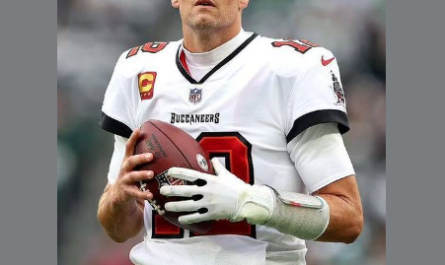Brett Favre: An Unexpected Drive to Greatness
Brett Favre is widely considered one of the greatest quarterbacks to ever play in the NFL. Over a 20-year career spent primarily with the Green Bay Packers, Favre established countless records and led his teams to numerous playoff appearances and Super Bowl victories. What’s often overlooked, however, is what drove Favre to sustain such a high level of play for so long in the NFL. On the surface, he was a gunslinging quarterback with incredible arm talent and a never-say-die competitive spirit. But beneath it all, there were some unexpected motivators that helped propel Favre’s legendary career.
Embracing the Underdog Mentality
One of Favre’s biggest motivators may have been playing with a constant chip on his shoulder. Despite going 33rd overall in the 1991 NFL Draft and becoming a three-time MVP, Favre reportedly thrived on the perception that he had something to prove. As he famously said, “I know I can play this game. I’m going to show you.” Even as he cemented his status among the all-time greats, Favre believed many still doubted his abilities. This underdog mentality served to keep him hungry and focused on exceeding expectations at every turn.
Coming from a small school like Southern Miss, Favre entered the league feeling he had to work harder than others to be noticed. He carried that drive with him throughout his career, using perceived slights as fuel. Former teammates remarked how Favre would come to practice angry if he read a negative comment, channeling it into an outstanding performance. Well into his 30s, he continued blocking out noise and playing with a chip on his shoulder, never satisfied with individual accolades. Embracing the role of underdog may have been a psychological advantage that helped prolong Favre’s prime.
Pure Love of the Game
Beyond any external factors, Favre simply seemed to love football more than almost anything. As he famously said, “I may not be the best quarterback, but I’m the most fun to watch.” For Favre, Sundays were about the joy of competition and leaving it all on the field, not stats or money or glory. His passion for the sport itself was evident in everything from pre-game rituals to spontaneous scrambles to willingness to play through injury.
Many close to Favre remarked how he treated practices and games like a kid in the backyard, playing solely for fun. Even late in his career, teammates said Favre approached each down like it was his last, unwilling to give less than his all. With so much intrinsic motivation from the pure thrill of football, Favre didn’t need outside recognition to stay hungry. As long as he was on the field, he was having the time of his life—and that love kept carrying him to new heights well into his 40s.
Adversity as a Learning Opportunity
Another driving force was Favre’s unique ability to use challenges as motivation rather than excuses. Throughout his career, he faced plenty of adversity from injuries to on-field struggles to criticism in the media. But Favre refused to dwell on setbacks or feel sorry for himself. As he said, “My philosophy is that you kind of let things roll off your back.”
Instead, he approached difficulties as opportunities for growth. Major injuries like a broken thumb were a “chance to rest my body and mind.” Bad games became lessons in what he needed to improve. Harsh words from analysts and fans were data points to analyze his own play. In this growth mindset, Favre constantly sought new levels after experiencing failure or hardship. His resilience and refusal to be defined by mistakes likely extended his prime far longer than peers who crumbled under pressure.
Fear of Losing His Job
Another compelling theory is that Favre played with a constant, underlying fear of losing his starting role. Well into his 30s and 40s, he competed each season against younger, hungry backups looking to take his job. Never comfortable or entitled, Favre treated every practice and game like an audition to prove he still gave his team the best chance to win.
Some argue this fear was mostly in Favre’s head given his production, but it clearly lit a competitive fire under him. He refused to take any downs off or get complacent, knowing one subpar outing could threaten his status. While exhausting mentally, that level of pressure may have kept Favre’s preparation, study habits and on-field intensity finely tuned even as his physical skills eroded. The will to keep his job week after week helped extend his prime far longer than if he’d rested on past accomplishments.
Staying in the Moment
Finally, Favre’s ability to live fully in the present may have been a key motivator. As he said, “You have to play one play at a time and not look at the whole game.” Always remaining focused on the down instead of the score or future implications likely maximized his performance. Living one play after another also kept Favre from dwelling on mistakes or letting external distractions creep in.
Teammates remarked how he treated every series like its own entity, hitting reset between each to concentrate purely on the next task. By blocking out past and future, Favre stayed hyper-focused on the controllable present moment. This mental discipline to live solely in the now could have been a competitive advantage, allowing him to consistently perform at a high level even late in his career. Not concerning himself with what happened last quarter or what might happen next kept Favre’s intensity and preparation finely tuned.
The Intangible Drive
Ultimately, what drove Favre may have been an intangible, relentless competitive fire and love for the game that simply couldn’t be extinguished. Beyond skill or physical prime, an internal motivation carried Favre for two decades at an elite level, shattering records along the way. While he embraced perceived slights and adversity, the root was a passion and joy for football itself that few in any sport have matched.
There will likely never be another quite like Favre—a gunslinging risk-taker who played purely for fun but achieved immortality through talent, heart and an unexpected inner drive. His legendary career shows that motivation comes in many forms, and intangibles can prolong greatness far longer than expected. Two decades after his final game, Favre’s story continues to inspire through relentless competitive spirit and love of the game above all else.



